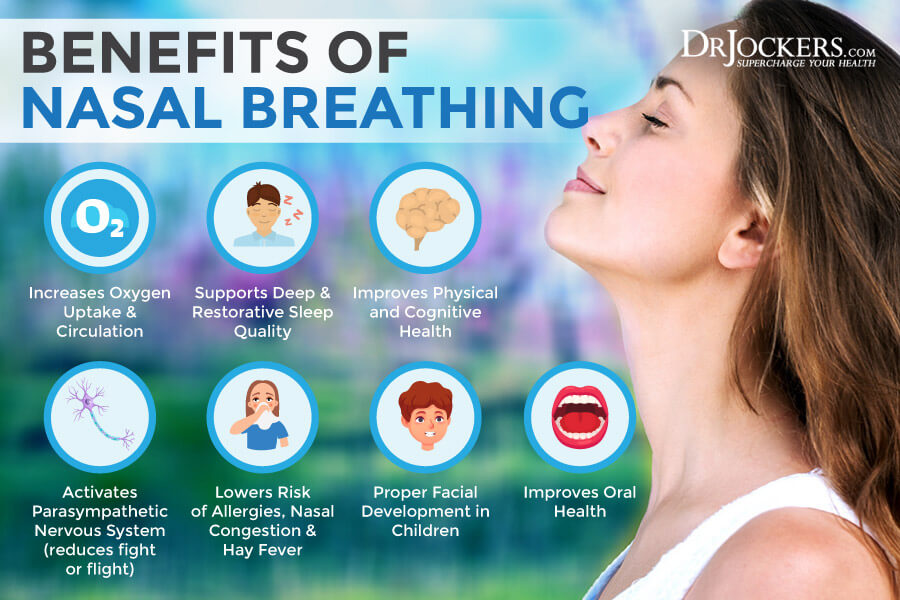The Benefits of Nose Breathing at Night
In this article, we will discuss the numerous benefits of nose breathing at night and how it can positively impact your sleep quality and overall well-being.
Improved Oxygen Intake
Nose breathing at night allows for better oxygen intake compared to mouth breathing. The structure of the nose, with its nasal passages and tiny hairs called cilia, helps filter and warm the air before it reaches the lungs. This process ensures that the air you breathe in is clean, moist, and at the right temperature, leading to improved oxygenation throughout the body.
Enhanced Sleep Quality
Engaging in nose breathing during sleep promotes better sleep quality. Breathing through the nose activates the parasympathetic nervous system, which helps induce a state of relaxation and calmness. This can lead to more restful and rejuvenating sleep, allowing you to wake up feeling refreshed and energized.
Reduced Snoring and Sleep Apnea
Nose breathing at night can help reduce snoring and alleviate symptoms of sleep apnea. When you breathe through your nose, the airway is kept open and the soft tissues in the throat are less likely to collapse or vibrate, which are common causes of snoring. For individuals with sleep apnea, nose breathing can help maintain a steady flow of oxygen, reducing the frequency and severity of breathing interruptions during sleep.
Improved Lung Function
Nose breathing encourages the use of the diaphragm and deep breathing, which can improve lung function. When you breathe through your nose, the air is distributed more evenly throughout the lungs, allowing for better oxygen exchange and carbon dioxide removal. This can enhance respiratory efficiency and overall lung health.
Enhanced Brain Function
Nose breathing at night has been linked to improved brain function and cognitive performance. The increased oxygen intake through nasal breathing supports optimal brain oxygenation, which is essential for proper cognitive function, memory consolidation, and overall mental clarity. By ensuring a steady supply of oxygen to the brain, nose breathing can help enhance focus, concentration, and overall cognitive abilities.
Reduced Dry Mouth and Dental Issues
Breathing through the nose at night helps prevent dry mouth, which can be caused by excessive mouth breathing. Mouth breathing during sleep can lead to a dry oral cavity, contributing to dental issues such as tooth decay and gum disease. Nose breathing helps maintain saliva production, which plays a crucial role in oral health and preventing dental problems.

Nose breathing at night offers a multitude of benefits, including improved oxygen intake, enhanced sleep quality, reduced snoring and sleep apnea symptoms, improved lung function, enhanced brain function, and reduced dry mouth and dental issues. By prioritizing nose breathing during sleep, you can optimize your overall well-being and wake up feeling refreshed and revitalized.
Frequently Asked Questions about Benefits of Nose Breathing at Night
1. Why is nose breathing better than mouth breathing at night?
Nose breathing at night helps filter, humidify, and warm the air, preventing dryness and irritation in the airways. It also promotes better oxygen absorption.
2. Does nose breathing improve sleep quality?
Yes, nose breathing during sleep can improve sleep quality by reducing snoring, promoting deeper breathing, and enhancing oxygenation, leading to more restful sleep.
3. Can nose breathing at night reduce the risk of sleep apnea?
Yes, nose breathing can help reduce the risk of sleep apnea by maintaining proper airflow and preventing obstructions in the throat.
4. Are there any benefits of nose breathing for people with allergies?
Yes, nose breathing can be beneficial for people with allergies as it helps filter allergens, reducing their impact on the respiratory system and minimizing symptoms.
5. Does nose breathing at night improve overall respiratory health?
Yes, nose breathing at night can improve respiratory health by promoting better lung function, reducing the strain on the respiratory system, and enhancing oxygenation.
6. Can nose breathing during sleep help with snoring?
Yes, nose breathing can help reduce snoring by keeping the airways open and preventing the vibrations that cause snoring.
7. Does nose breathing at night affect blood oxygen levels?
Yes, nose breathing at night can improve blood oxygen levels by facilitating better oxygen absorption in the lungs compared to mouth breathing.
8. Are there any benefits of nose breathing for athletes during sleep?
Yes, nose breathing can benefit athletes during sleep by optimizing oxygen intake, enhancing recovery, and promoting better overall performance.
9. Can nose breathing at night help with anxiety and stress?
Yes, nose breathing at night can help reduce anxiety and stress by activating the parasympathetic nervous system, inducing relaxation, and promoting a calmer state of mind.
10. Is nose breathing recommended for everyone during sleep?
While nose breathing is generally beneficial, it may not be suitable for individuals with certain medical conditions. It’s best to consult with a healthcare professional for personalized advice.




